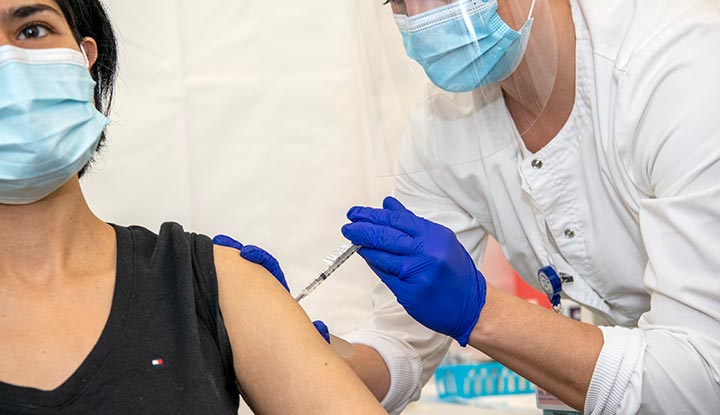An mRNA vaccine is a preventive treatment that trains your body to fight infectious diseases. Only COVID-19 vaccines currently use mRNA technology. They work by giving your body instructions to make a small part of the virus so your immune system can generate tools to fight an infection if it sees the virus again in the future.
Advertisement
Cleveland Clinic is a non-profit academic medical center. Advertising on our site helps support our mission. We do not endorse non-Cleveland Clinic products or services. Policy

Image content: This image is available to view online.
View image online (https://my.clevelandclinic.org/-/scassets/images/org/health/articles/21898-mrna-vaccine-2028301.jpg)
An mRNA vaccine is a preventive treatment that helps your body learn to fight diseases. A healthcare provider gives you the vaccine in a shot or series of shots.
Advertisement
Cleveland Clinic is a non-profit academic medical center. Advertising on our site helps support our mission. We do not endorse non-Cleveland Clinic products or services. Policy
The only mRNA vaccines currently available are to protect against COVID-19. They include:
Scientists are investigating other ways to use mRNA technology in vaccines for other infectious diseases and cancer.
MRNA — or messenger ribonucleic acid — is a molecule in your cells that copies instructions from your DNA and brings them to your ribosomes (protein-making structures in your cells). Your ribosomes use the instructions on mRNA to create proteins that make your body work.
The mRNA in vaccines carries the instructions for making a single part of a pathogen (germ) so that your immune system can recognize it.
Like all vaccines, mRNA vaccines work by training your body to recognize and create tools to fight something harmful (like a virus). For COVID mRNA vaccines, they do this by giving your cells the mRNA instructions they need to make the spike protein — a unique, recognizable part of SARS-CoV-2 (the virus that causes COVID-19).
Ideally, your body responds to the protein by recognizing it as an invader. Your immune system creates tools — like antibodies — to fight an infection off more quickly the next time it sees the same protein.
Advertisement
Just like the mRNA your body produces for its own instructions, the mRNA from the vaccines breaks down in your body in a few days.
The difference between mRNA vaccines and traditional vaccines is how they get your immune system to recognize a virus. Other vaccines use a deactivated (“killed”) virus, a weakened virus, or parts of the virus (protein subunit). MRNA vaccines don’t use any parts of a virus, but instead give your body instructions to make a recognizable part of the virus.
No. The Novavax® vaccine isn’t an mRNA vaccine; it’s a protein subunit vaccine. It uses a piece of the SARS-CoV-2 virus to activate the immune response in your body.
Healthcare providers give mRNA vaccines as injections (shots). A provider will:
Your provider may ask you to wait at least 15 minutes before leaving to make sure you don’t have an immediate allergic reaction. You may want to sit while you wait if shots make you feel faint.
Compared to other types of vaccines, mRNA technology allows researchers to develop vaccines quickly, since labs don’t have to grow copies of the virus. This can mean creating enough vaccines for everyone (once developed) in just weeks, instead of months.
Compared to not getting vaccinated, mRNA vaccines (and any current COVID vaccine) can reduce your risk of:
Risks of mRNA vaccines include side effects and allergic reactions.
Side effects of mRNA COVID vaccines include:
You could have an allergic reaction to one of the ingredients in the vaccine. Signs of an allergic reaction include:
Go to an emergency room immediately if you have signs of a severe allergic reaction, including trouble breathing, severe hives or swelling of your face, lips, tongue or throat.
Talk to your healthcare provider if you have concerns about mRNA vaccines or which COVID vaccine is right for you.
Research into mRNA technology dates back to the 1970s. Scientists first started applying it to vaccine development in the 1990s. It took over 20 years of research to learn how to get our immune systems to recognize the mRNA without destroying it too quickly, and how to get it into our cells.
Advertisement
Finally, in 2018, the FDA approved patisiran (Onpattro®), a drug that treats a rare nerve disease. The method patisiran uses to deliver RNA (lipid nanoparticles) paved the way for Moderna and Pfizer-BioNTech to use it in their COVID vaccines. The FDA authorized the first COVID vaccines for emergency use in the U.S. in December of 2020.
Change can make us uneasy. Especially in medicine, it can take time to accept something that’s different from the old, familiar way of doing things that we’re all comfortable with.
But researchers have been developing mRNA technology for decades. It’s allowed scientists to create safe, effective vaccines faster than ever before. This means when there’s an outbreak of severe illness, we can potentially have the protection of vaccines in a matter of months instead of years. (The timeline depends on how long it takes to find the part of the virus that generates an immune response.) Tiny but mighty, mRNA molecules may also play a role in other, future treatments to help treat a variety of diseases.
Advertisement

Sign up for our Health Essentials emails for expert guidance on nutrition, fitness, sleep, skin care and more.
Learn more about the Health Library and our editorial process.
Cleveland Clinic’s health articles are based on evidence-backed information and review by medical professionals to ensure accuracy, reliability and up-to-date clinical standards.
Cleveland Clinic’s health articles are based on evidence-backed information and review by medical professionals to ensure accuracy, reliability and up-to-date clinical standards.
Cold, flu or COVID-19? Cleveland Clinic will help you figure out what to do next.
